Ive found its a whole lot faster to use a quality IR temp gun, to locate a individual cylinder that's mis-firing as it tends to run significantly cooler than adjacent cylinders, or hotter if its a vacuum leak at times, as lean F/A mixes tend to run hotter
(Ive used this one for years)
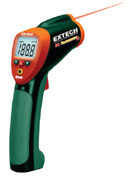
http://www.professionalequipment.com/ex ... ermometer/
Wide temperature range from -58 to 1832°F (-50 to 1000°C)
many temp guns don,t read high enough or accurately enough
http://www.professionalequipment.com/ex ... ermometer/
that you can use on the engine to check ALL 8 exhaust temps, individually, this quickly locates plugged injectors or vacuum leaks ETC
Wide temperature range from -58 to 1832°F
when selecting an IR gun for automotive use, you really want to be able to read from 0 F deg-about 1400F deg. to cover most conditions you'll test for
heres the one I use...(THIS TOOL ABOVE)...now ILL grant you , that you can buy a whole lot cheaper tool for checking tires, but I use mine basically for reading header temps, RADIATOR TEMPS AND AIR CONDITIONER TEMPS, and to detect mixture or ignition problems or missing cylinders and you may not want to spend the money,but its an excellent tool, that's been consistently a huge time saver on tracking down problems
heres a cheap one (below)
http://www.innovatemotorsports.com/products/lm2.php
http://www.professionalequipment.com/ex ... ermometer/ Wide temperature range from -58 to 1400°F
heres a far better one but still less expensive
(below)
http://www.professionalequipment.com/ex ... ermometer/
at times they are WELL WORTH THE MONEY in lowering the time and effort required in diagnosing problems, and yeah! you do get what you PAID FOR in the better models
the key here is knowing what your looking for in a temp range,
Its not so much any exact temperature,... if your cars running correctly, run it around the block a few times then stop, lift the hood and read each individual cylinders exhaust port or header near the cylinder heads and take notes, as to each cylinders temperature, they should all be in a 50-75 degree range , now, your displacement, compression ratio, ignition timing and fuel air ratio will effect that temperature so it may be 400F-800F, but its the difference between cylinders that your looking for as that indicates a potential problem,.....later when you find the cars running rough in the future, do the same thing and be aware that low temps usually indicate missing ignition of fouled plugs or overly rich f/a ratio, hotter than average temps can usually indicate vacuum leaks, faulty injectors etc. temps generally fall in the 400f-800 F range depending n tuning, compression, type of headers average rpms. length of run time, outside temps, etc. you'll need to become familiar with your car, the key is looking for consistency! and yes the rear and center two cylinders tend to run just a bit hotter from less airflow cooling
I use this
http://www.levineautoparts.com/autez60obdii.html?gclid=CIyegunhrZMCFRUWsgod8UyRog
viewtopic.php?f=44&t=621&p=831&hilit=+spark+plugs+rich#p831
but you can learn a good deal with
a factory shop manual,
fuel pressure gauge,
a timing light,
V.O.M. meter,
vacuum gauge
and infrared temp gun that reads in the 400f-1400f range
along with the skill to be correctly reading spark plugs and a fuel pressure gauge
READ THRU THESE Links AND THEIR SUB LINKS CAREFULLY
viewtopic.php?f=44&t=773&p=2253&hilit=+tuning+start#p2253
viewtopic.php?f=62&t=882&p=5410&hilit=+power+valve+vacuum#p5410
viewtopic.php?f=44&t=777&p=4546&hilit=+power+valve+vacuum#p4546
viewtopic.php?f=55&t=109&p=6685&hilit=+pump+carb+cam#p6685
viewtopic.php?f=44&t=1788&p=4542&hilit=+pump+carb+cam#p4542
viewtopic.php?f=55&t=1961&p=5203#p5203
don,t go expecting that theres an IDEAL temperature on the headers your trying to maintain,
Thats just it!
you DON,T look for an ideal cylinder temps,with the IR gun, YOU LOOK for close consistency between the exhaust temps at the headers as they leave the exhaust ports and you use the condition of the spark plugs, to get a great deal more info. on cylinder conditions and fuel/air ratios and timing, its almost mandatory that you know all that info to tune.
you don,t have an ideal temp because that changes with compression, cam timing,idle rpm,header materials, and displacement, ignition timing curves, fuel octane, even outside temps and altitude, but what you do have is the ability to make the engine run consistently between all cylinders and read the plugs to gauge burn conditions very closely
viewtopic.php?f=70&t=202
http://www.4secondsflat.com/Spark_plug_reading.html
a spark checker can be useful
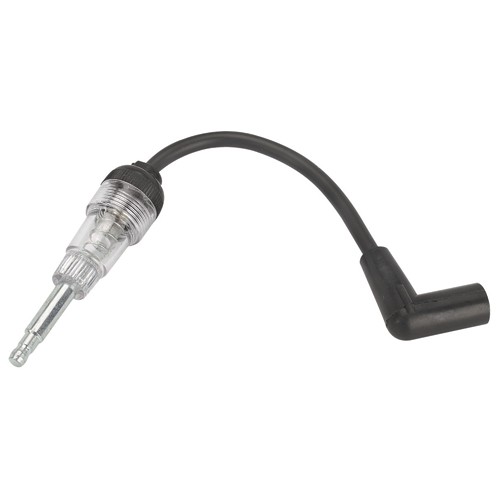
I doubt youll see engine block temps exceeding about 350F and keep in mind that coolant rarely exceeds 270F and oil rarely exceeds 300F even in extreme conditions when things are not working as designed BUT exhaust manifold temps commonly exceed 550F-850F and in many cases the exhaust manifolds, or headers are located very close to the heads and block in some header and manifold designs, so reflected heat is significantly higher than you might imagine near the headers

http://www.professionalequipment.com/ex ... ermometer/
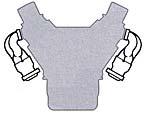
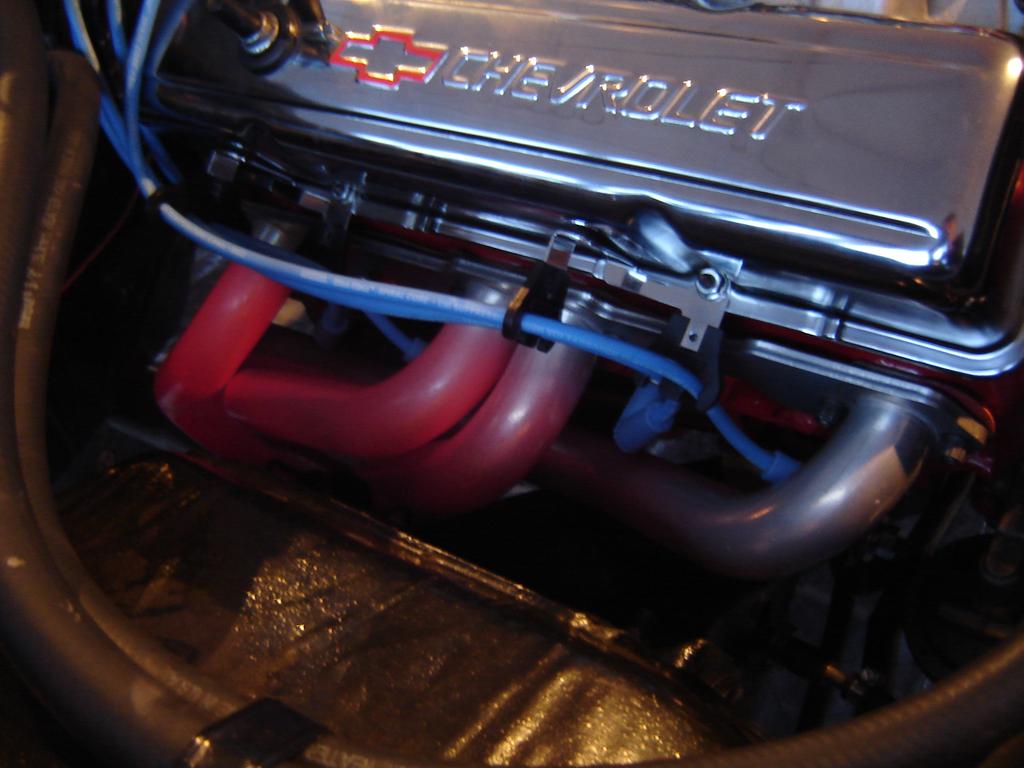

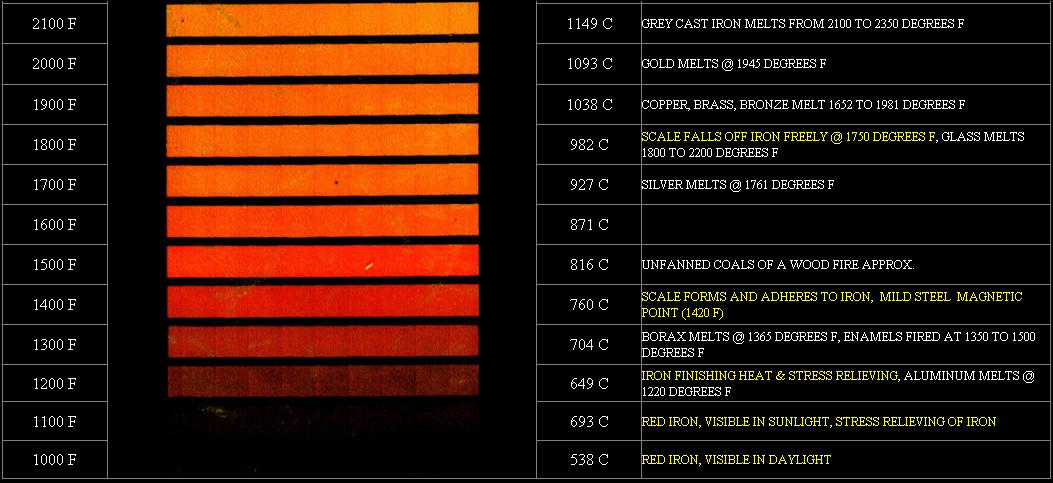
(Ive used this one for years)

http://www.professionalequipment.com/ex ... ermometer/
Wide temperature range from -58 to 1832°F (-50 to 1000°C)
many temp guns don,t read high enough or accurately enough
http://www.professionalequipment.com/ex ... ermometer/
that you can use on the engine to check ALL 8 exhaust temps, individually, this quickly locates plugged injectors or vacuum leaks ETC
Wide temperature range from -58 to 1832°F
when selecting an IR gun for automotive use, you really want to be able to read from 0 F deg-about 1400F deg. to cover most conditions you'll test for
heres the one I use...(THIS TOOL ABOVE)...now ILL grant you , that you can buy a whole lot cheaper tool for checking tires, but I use mine basically for reading header temps, RADIATOR TEMPS AND AIR CONDITIONER TEMPS, and to detect mixture or ignition problems or missing cylinders and you may not want to spend the money,but its an excellent tool, that's been consistently a huge time saver on tracking down problems
heres a cheap one (below)
http://www.innovatemotorsports.com/products/lm2.php
http://www.professionalequipment.com/ex ... ermometer/ Wide temperature range from -58 to 1400°F
heres a far better one but still less expensive
(below)
http://www.professionalequipment.com/ex ... ermometer/
at times they are WELL WORTH THE MONEY in lowering the time and effort required in diagnosing problems, and yeah! you do get what you PAID FOR in the better models
the key here is knowing what your looking for in a temp range,
Its not so much any exact temperature,... if your cars running correctly, run it around the block a few times then stop, lift the hood and read each individual cylinders exhaust port or header near the cylinder heads and take notes, as to each cylinders temperature, they should all be in a 50-75 degree range , now, your displacement, compression ratio, ignition timing and fuel air ratio will effect that temperature so it may be 400F-800F, but its the difference between cylinders that your looking for as that indicates a potential problem,.....later when you find the cars running rough in the future, do the same thing and be aware that low temps usually indicate missing ignition of fouled plugs or overly rich f/a ratio, hotter than average temps can usually indicate vacuum leaks, faulty injectors etc. temps generally fall in the 400f-800 F range depending n tuning, compression, type of headers average rpms. length of run time, outside temps, etc. you'll need to become familiar with your car, the key is looking for consistency! and yes the rear and center two cylinders tend to run just a bit hotter from less airflow cooling
I use this
http://www.levineautoparts.com/autez60obdii.html?gclid=CIyegunhrZMCFRUWsgod8UyRog
viewtopic.php?f=44&t=621&p=831&hilit=+spark+plugs+rich#p831
but you can learn a good deal with
a factory shop manual,
fuel pressure gauge,
a timing light,
V.O.M. meter,
vacuum gauge
and infrared temp gun that reads in the 400f-1400f range
along with the skill to be correctly reading spark plugs and a fuel pressure gauge
READ THRU THESE Links AND THEIR SUB LINKS CAREFULLY
viewtopic.php?f=44&t=773&p=2253&hilit=+tuning+start#p2253
viewtopic.php?f=62&t=882&p=5410&hilit=+power+valve+vacuum#p5410
viewtopic.php?f=44&t=777&p=4546&hilit=+power+valve+vacuum#p4546
viewtopic.php?f=55&t=109&p=6685&hilit=+pump+carb+cam#p6685
viewtopic.php?f=44&t=1788&p=4542&hilit=+pump+carb+cam#p4542
viewtopic.php?f=55&t=1961&p=5203#p5203
don,t go expecting that theres an IDEAL temperature on the headers your trying to maintain,
Thats just it!
you DON,T look for an ideal cylinder temps,with the IR gun, YOU LOOK for close consistency between the exhaust temps at the headers as they leave the exhaust ports and you use the condition of the spark plugs, to get a great deal more info. on cylinder conditions and fuel/air ratios and timing, its almost mandatory that you know all that info to tune.
you don,t have an ideal temp because that changes with compression, cam timing,idle rpm,header materials, and displacement, ignition timing curves, fuel octane, even outside temps and altitude, but what you do have is the ability to make the engine run consistently between all cylinders and read the plugs to gauge burn conditions very closely
viewtopic.php?f=70&t=202
http://www.4secondsflat.com/Spark_plug_reading.html
a spark checker can be useful

I doubt youll see engine block temps exceeding about 350F and keep in mind that coolant rarely exceeds 270F and oil rarely exceeds 300F even in extreme conditions when things are not working as designed BUT exhaust manifold temps commonly exceed 550F-850F and in many cases the exhaust manifolds, or headers are located very close to the heads and block in some header and manifold designs, so reflected heat is significantly higher than you might imagine near the headers

http://www.professionalequipment.com/ex ... ermometer/





